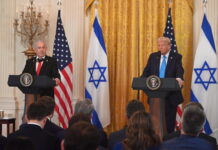Muslims have been celebrating Katie Hopkins being kicked off Twitter, but pro-Palestine activist Laura Stuart asks whether the activists who were instrumental in her downfall could have some Muslims in their crosshairs as well.
The big news on social media this week has been the suspension of Katie Hopkins’ Twitter account.
Silencing Hopkins was celebrated widely by the unwary because, vile though Hopkins is, in my view she is clearly being used as a “stalking-horse” and just who the real targets are (other than the pro-Palestinian leftist George Galloway) will no doubt become more obvious in future.
Many Zionist organisations have been pushing for “online hate” to be closed down on social media, but others see this as the silencing of leftists and activists who report on Israeli abuses of Palestinians and those who expose the power of pro-Israel lobby groups who work to advantage Tel Aviv politically.
And it’s interesting to notice just who’s claiming the credit for Twitter closing down Katie Hopkins. A few days ago, Rachel Riley, a middling TV Celebrity, Israel supporter and fierce critic of Labour leader Jeremy Corbyn, tweeted:
“I met with Twitter yesterday with @imi_ahmed from @CCDHate and asked them among other things to review George Galloway and Katie Hopkin’s presence on their platform. I am pleased to see that action has already been taken”.
But could it be that Rachel Riley is using her connection to the Center for Countering Digital Hate to settle a personal grievance/grudge with George Galloway whom she told to “F*ck off” in a tweet a year ago.
Subscribe to our newsletter and stay updated on the latest news and updates from around the Muslim world!
And this begs the question: who decides what hate speech is online and could political allegiances override neutrality?
Imran Ahmed
Moreover, who is Imran Ahmed and what is the Center for Countering Digital Hate?
On its website the organisation says: “The Center for Countering Digital Hate deals with the increasing use of racial and religious intolerance, sexism, homophobia, and other forms of identity-based hate to polarise societies and undermine democracy. We find practical solutions to this threat, producing policy solutions and actions we can all take to counter hate.
“Hateful discourse hardens differences, coarsens the public sphere and leads to anger and violence… Populist politicians have allied with haters to gain new advocates and troll armies which harass opponents and institutions that provide checks and balances in liberal states, like the media and judiciary. If we do not deal with this threat, it will continue to divide our societies and undermine the strength of our democratic systems.”
A quick internet search reveals a blog post named “Wirral In It Together” describing Ahmed previously as the New Labour MP Angela Eagle’s P.R. in a post about a puzzling incident known as “Brickgate.” I recommend people read the post to understand more.
The first mention of The Centre in Countering Digital Hate was on September 18th, 2019 in an article in the Guardian entitled “The Best Way to Deal With Online Trolls, Do Like Rachel Riley and Starve Them of Oxygen.” Then there was an article on the BBC “Online Trolls: Why they abuse Celebs and how to Combat it.”
It certainly is remarkable that major news outlets would be interested in the launch of a brand new NGO with no track record, which means that the CCDH is clearly very well connected.
The CCDH states they receive funding from “Unbound Philanthropy,” which is described as a “New York City based left wing donor affinity group that primarily funds groups that support left of centre liberal expansionist immigration policies.”
It continues: “Unbound has close ties to George Soros’s Open Society Foundations through the group’s Executive Director Taryn Higashi. Higashi sits on an advisory board of Open Society Foundations and is an alumna of the left of centre Ford Foundation, where she worked on immigrant and refugee issues.”
More worryingly, on the CCDH website we can see an endorsements from Sara Khan from the Commission for Countering Extremism, Nick Lowles of Hope not Hate and Fiyaz Mughal, former Director of Faith Matters and founder of Tell Mama, plus Kim Leadbetter Ambassador of the Jo Cox Foundation.
And at least two of the above (Khan and Mughal) have been heavily criticised by many Muslim organisations for targeting Muslim activists and siding with pro-Israel groups.
Commenting on the CCDH’s work, Sara Khan said: “Online hate is one of, if not the, most significant concern people have when we discuss extremism. There’s a role for all of us in making the online world less toxic. Innovative initiatives like this are absolutely vital and I hope this project inspires much more work like it.”
Fiyaz Mughal, who recently criticised the government for not taking a tough enough approach to “Islamists,” was no less gushing.
“Imran Ahmed is a leading expert in the networks and tactics of hate, especially their use of digital spaces. Having first worked with him many years ago, on issues such as anti-Muslim hatred and community cohesion, I know he is a committed champion of liberalism, tolerance, and democratic values. He and the CCDH will be a key ally in the fight to defend these values, which are all under threat today.”
So given the kind of company the CCDH keeps, all those who believe that free speech is an integral part of British Values will no doubt be watching its work with interest.





















